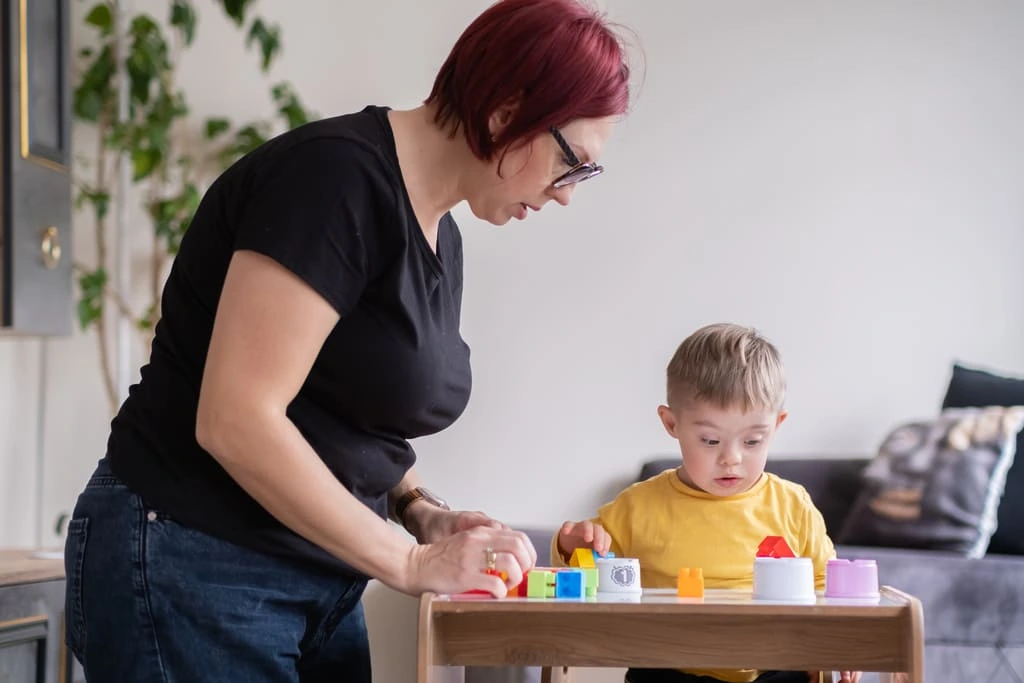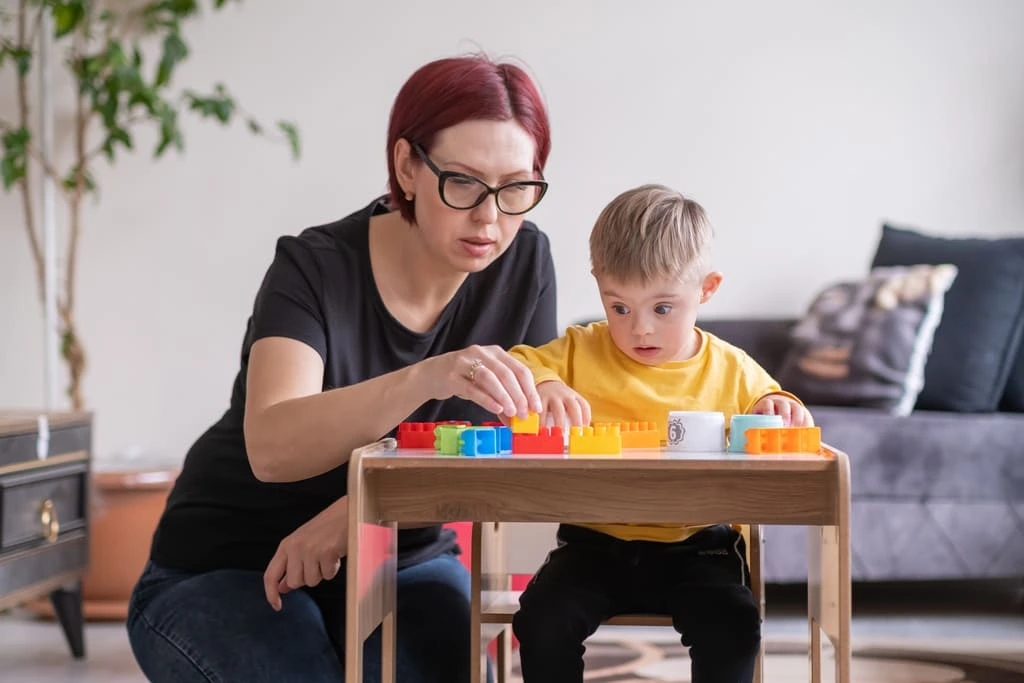What Is Considered a Severe Learning Disability (SLD)?
A severe learning disability (or severe intellectual disability) refers to profound developmental challenges in acquiring and using skills across various areas of learning. Individuals with severe learning disabilities may struggle with multiple aspects of learning, such as reading, writing, mathematics, reasoning, memory, and organisational skills. These difficulties often manifest early in life and persist throughout the individual’s development.
Symptoms of severe learning disability might include problems with social interaction, inability to manage daily life activities alone, and challenging behaviour. Learning disabilities are intrinsic to the individual’s neurological and cognitive development. Supporting individuals with severe learning disabilities requires a tailored approach acknowledging their unique strengths and challenges. Specialised education plans, individualised interventions, and assistive technologies can play pivotal roles in helping individuals maximise their potential and lead fulfilling lives.
Characteristics of Severe Learning Disabilities
Severe learning disabilities significantly affect an individual’s ability to obtain, process, and apply information. These disabilities are characterised by a persistent challenge in various cognitive functions, leading to difficulties with academic, social, and everyday tasks. People with a severe learning disability often require specialised interventions, support, and accommodations to achieve their full potential.
Individuals with severe learning disabilities may experience the following difficulties:

- Difficulty acquiring literacy and numeracy skills
- Severely impacted communication abilities
- Challenges with memory and information retention
- Poor motor coordination, impacting tasks like handwriting and other fine motor activities
- Challenges with executive functions, including planning, organisation, problem-solving, and abstract thinking
- Inability to understand social cues and engage in meaningful social interactions
Nonverbal Learning Disabilities (NVLD)
Nonverbal learning disabilities (NVLD) are a distinct group of learning disabilities that primarily affect an individual’s nonverbal cognitive functions and social skills. Unlike some other learning disabilities, people with NVLD typically have average to above-average verbal abilities, which can sometimes mask the extent of their challenges. However, these disorders can have significant and far-reaching impacts on an individual’s academic, social, and emotional well-being.
The average person with a nonverbal learning disability struggles with spatial perception, hindering tasks like reading maps or understanding geometric concepts. Furthermore, NVLD often causes motor coordination issues that impair the person’s ability to engage in basic activities, such as tying shoelaces or using kitchen utensils. Socially, individuals with NVLD find it difficult to interpret nonverbal cues like facial expressions or body language, preventing them from appropriately responding in various situations.
Profound and Multiple Learning Disabilities (PMLD)
Profound and multiple learning disabilities (PMLD) refer to complex and severe learning disabilities that encompass a combination of profound cognitive and physical disabilities. Individuals with PMLD experience significant challenges in intellectual functioning, often displaying limited communication skills and requiring substantial support for daily activities. A multiple learning disability is typically present from birth or early childhood and can result from genetic and neurological factors.
People with PMLD have a wide range of needs and often require assistance in every aspect of their lives. Due to their poor motor skills, they need specialised equipment for movement and communication. As PMLD severely limits speech, individuals have to communicate through gestures, sign language, or augmentative and alternative communication (AAC) devices. PMLD symptoms also include sensory sensitivities and challenges with processing sensory information, leading to significant distress and challenging behaviour in environments that lack proper accommodations.
Different Levels of Learning Disabilities
Learning disabilities range from mild to severe, with varying levels of impact on the person’s functioning. A mild learning disability involves challenges in understanding new information and learning new skills, with challenges in areas like reading, writing, or maths. Individuals with moderate learning disabilities face more complex challenges with understanding information and learning skills. Finally, severe learning disabilities cause substantial challenges in multiple areas, including communication, motor skills, and sensory perception. The diverse range of learning disabilities highlights the need for personalised interventions that match each individual’s unique needs.
What Is Considered a Moderate Learning Disability?
A moderate learning disability typically involves challenges with learning new skills and information, with challenges in academic areas such as reading, writing, or maths, where the individual may struggle to acquire skills at a pace consistent with their peers. While individuals with moderate learning disabilities often require targeted interventions and support, they generally exhibit a greater ability to grasp and apply concepts than people with severe learning disabilities.

Impact on Education and Learning
Severe learning disabilities have a substantial impact on education and learning, impacting various cognitive functions. Individuals often struggle to grasp fundamental concepts and face difficulties with academic progress. Communication difficulties lead to low participation in class discussions and collaborative activities. Complex tasks like problem-solving and critical thinking may be especially challenging. Moreover, memory challenges may impact information retention.
Due to social and emotional struggles, children and young people with severe learning disabilities may find it hard to form meaningful connections with their peers. These challenges require specialised teaching methods, individualised plans, and assistive technologies. Addressing severe learning disabilities requires a multidimensional approach to ensure inclusive education and promote holistic development.
Personalised Educational and Care Plans
Individuals with severe learning disabilities need personalised educational and care strategies to achieve their full potential. These plans tailor interventions to each individual’s specific needs, challenges, and strengths. Experts set academic goals at an achievable pace, utilising specialised teaching methods and assistive technologies. Social and emotional support strategies address communication difficulties and foster peer interactions.
Therapy plans for people with a severe learning disability target motor skills, social development, and everyday life skills. With regular assessments, experts can monitor progress and adapt strategies to the person’s needs. Collaboration among educators, therapists, and caregivers ensures a holistic approach, enhancing the individual’s overall quality of life and maximising their independence.
Personalised Care Plans with Leaf Complex Care
Leaf Complex Care’s mission revolves around delivering humanised assistance to individuals with complex care needs, including severe learning disabilities. Our trained support workers take an outcome-based, person-centred approach to support people with complex care needs. We provide medical support and social care services that help autistic people and other individuals with severe learning difficulties to become an active part of their local communities.
We strive to dismantle the social stigma surrounding learning disabilities and remove the barriers imposed on individuals, allowing them to live independent and fulfilling lives. We create a personalised plan that takes into consideration the person’s health needs and personal care preferences. The Leaf team always prioritises privacy, dignity, and safety.
If you need extra support for a loved one with a severe learning disability, Leaf Complex Care is the right place for you. We provide high-standard, CQC-regulated home care services across the UK, with our offices in Bristol, Slough, Somerset, and the Midlands.
Contact us now, and we will outline a tailored plan catering to your specific needs.


















